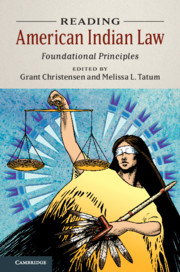Book contents
- Reading American Indian Law
- Reading American Indian Law
- Copyright page
- Dedication
- Contents
- Editors and Contributors
- Preface
- Acknowledgments
- Introduction
- Part I Core Concepts
- Part II Voices
- Part III Property
- Part IV (Mis)Understandings
- 13 Dependent Sovereigns: Indian Tribes, States, and the Federal Courts
- 14 There Is No Federal Supremacy Clause for Indian Tribes
- 15 American Indians, Crime, and the Law
- 16 Factbound and Splitless: The Certiorari Process As Barrier to Justice for Indian Tribes
- Book part
- References
15 - American Indians, Crime, and the Law
from Part IV - (Mis)Understandings
Published online by Cambridge University Press: 11 December 2019
- Reading American Indian Law
- Reading American Indian Law
- Copyright page
- Dedication
- Contents
- Editors and Contributors
- Preface
- Acknowledgments
- Introduction
- Part I Core Concepts
- Part II Voices
- Part III Property
- Part IV (Mis)Understandings
- 13 Dependent Sovereigns: Indian Tribes, States, and the Federal Courts
- 14 There Is No Federal Supremacy Clause for Indian Tribes
- 15 American Indians, Crime, and the Law
- 16 Factbound and Splitless: The Certiorari Process As Barrier to Justice for Indian Tribes
- Book part
- References
Summary
American Indians, Crime, and the Law: looks at criminal justice in Indian country not from the perspective of Indian law and policy but through the lens of criminal law and policy. It recognizes that criminal jurisdiction in Indian country places a disproportionate weight on federal prosecution of on-reservation crime because the state lacks the authority to enforce laws, and tribes have limited criminal powers over non-Indians. Washburn questions whether prosecutorial discretion can be appropriately exercised when outsiders prosecute local crimes in Indian country and when juries often fail to include tribal members.
- Type
- Chapter
- Information
- Reading American Indian LawFoundational Principles, pp. 357 - 380Publisher: Cambridge University PressPrint publication year: 2019



